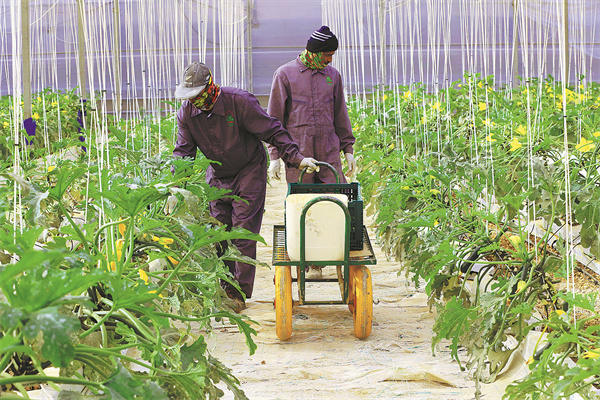Chinese technology shines at World Cup


The good Chinese partner
"It only takes two hours for our leaf vegetables to be taken to market from the farm so our produce is much fresher compared to imported produce which can take at least five days," said Gao Yuntao, the person Alfardan described as his "good Chinese partner".
Gao, who comes from Chongqing municipality and has been in Qatar for 10 years, was interviewed by Chinese media outlets during the World Cup.
"We grow high-quality produce at very competitive prices", said Gao, who is also the general manager of the smart LED plant factory on the Alfardan family farm.
"The two types of lettuce we grow will be supplied to the German and Dutch training camps during the World Cup," he said, adding their main customers are the 800,000 to 900,000 Southeast and East Asians working in Doha.
According to Gao, the farm adopted China's world-leading smart LED plant factory technology and makes use of shipping containers abandoned in the desert around the deep-water port of Doha, which is reconfigured and equipped with cooling and heat preservation systems.
Vegetables are not planted in the ground, but grow without soil in multilayered containers, each layer equipped with pipes that provide nutrient solutions.
Compared to traditional agriculture, Gao said the technology is more efficient, more resistant to heat and pests and also makes more efficient use of water and fertilizer.
Vegetables grown on the farm have made their way to five-star hotels, Chinese restaurants and high-end supermarkets in Qatar, Gao said.
"They have been tested by the Qatari national authorities and comply with European Union standards," he added.
Gao started to grow vegetables in Qatar four years ago with teammate, Ling Yuhao. They mainly planted rape and lettuce at first.
He said that Spanish teams had worked on growing vegetables in Qatar in 1974 but had not succeeded, and even Qataris thought it was impossible to grow vegetables in the desert. However, they were able to succeed with the help of new Chinese technology.
Gao's factory has expanded from growing lettuce and rape to some 30 varieties of vegetables, including peppers, cabbage, spinach, and celery.
"We will expand production next year and increase the number of containers from 60 to 200," Gao said, adding that he hoped more Chinese companies would come to Qatar and join forces on development.
Agriculture going global
In addition to vegetables, many other Chinese agricultural technologies helped make the World Cup a success.
For instance, technical support for the irrigation and maintenance of the football pitches was provided by China's Ningxia University.
Developed over the last 11 years, the university's underground infiltration irrigation system that was used in stadiums differs from drip irrigation and sprinkler irrigation, which are both aboveground operations.
It can apply water and fertilizer directly to the roots of the grass, reducing the loss of water through evaporation by more than 34 percent compared to drip irrigation technology.

































